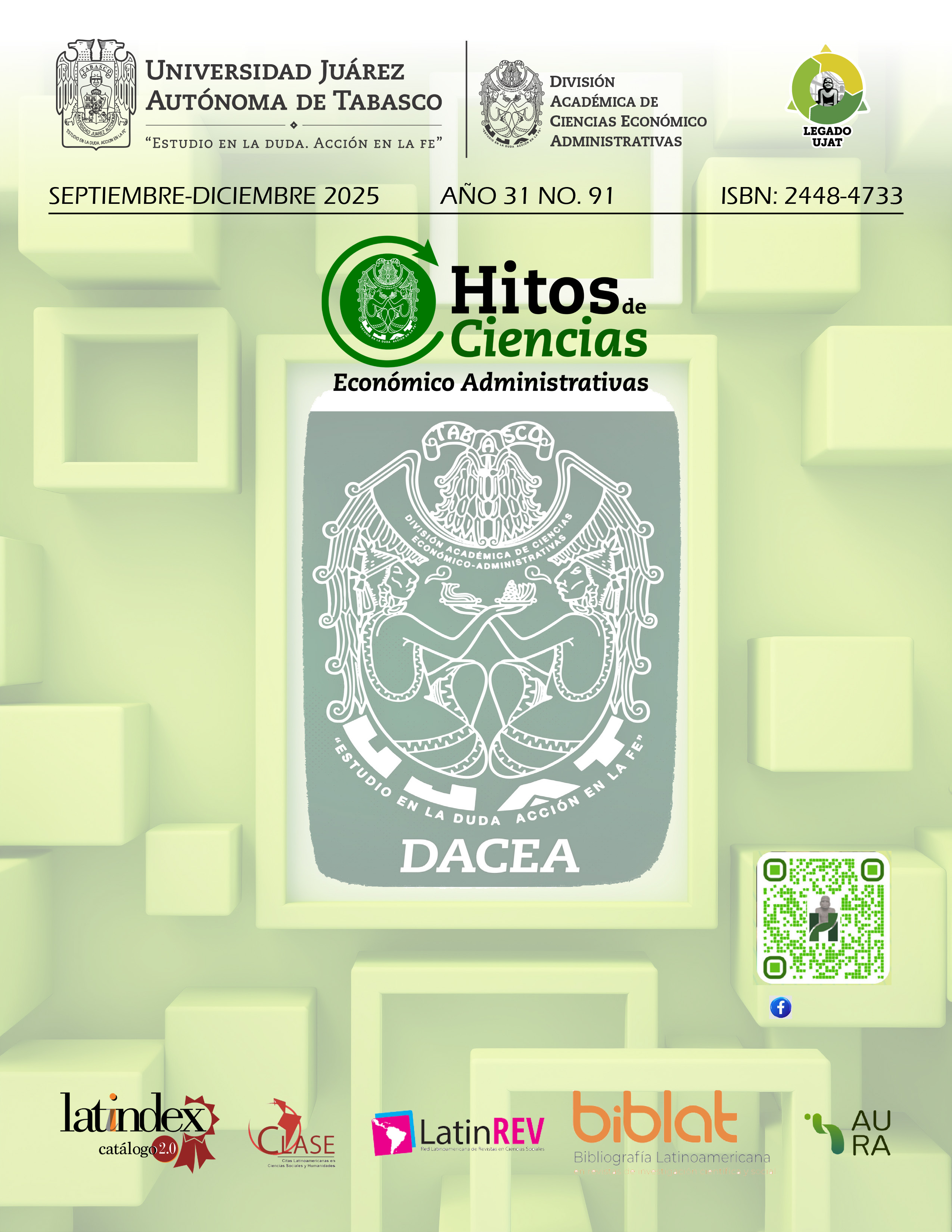Conflict management as a managerial strategy to improve organizational climate in higher education
DOI:
https://doi.org/10.19136/hitos.a31n91.6387Keywords:
organizational climate, educational management, managerial skills, higher education institutions, conflict management.Abstract
OBJECTIVE: To determine the effect of conflict management as a management strategy on the organizational climate in public higher education institutions.
MATERIAL AND METHOD: A quantitative, non-experimental, cross-sectional, causal design was employed, with linear regression analysis, bootstrapping, and subgroup segmentation.
RESULTS: Findings reveal a positive, significant, and robust effect of conflict management on the perception of organizational climate.
CONCLUSIONS: This study provides useful empirical evidence for the design of institutional policies aimed at organizational well-being and managerial training in conflict resolution skills.
Downloads
References
Abdullah, M. S., Alias, M. A. y Hamid, R. A. (2025). Conflict management strategies and organizational climate in higher education institutions. Journal of Educational Administration, 63(1), 112–128. https://doi.org/10.1108/JEA-2025-0001
Amalou, S. y Brahimi, M. (2023). Bibliometric analysis of conflict management and organizational health: Trends and research opportunities. International Journal of Organizational Analysis, 31(2), 265–281. https://doi.org/10.1108/IJOA-05-2023-0241
Blomberg, S., Einarsen, S. y Rosander, M. (2025). Organizational conflict and employee well-being: A longitudinal study in public sector organizations. European Management Journal, 43(2), 213–229. https://doi.org/10.1016/j.emj.2025.01.005
Cámara de Diputados del H. Congreso de la Unión. (2010). Ley Federal de Protección de Datos Personales en Posesión de los Particulares. Diario Oficial de la Federación. https://www.diputados.gob.mx/LeyesBiblio/pdf/LFPDPPP.pdf
Cohen, J. (1988). Statistical power analysis for the behavioral sciences (2nd ed.). Lawrence Erlbaum Associates.
Field, A. (2018). Discovering statistics using IBM SPSS Statistics (5th ed.). SAGE Publications.
García-Ramírez, A. y López-Medina, J. (2022). Clima organizacional y desempeño docente en instituciones de educación superior. Revista de Ciencias Sociales y Humanas, 20(1), 55–70.
Gao, J., Wang, Y. y Liu, M. (2024). Organizational climate as a mediator between leadership styles and job performance: Evidence from Chinese universities. Asia Pacific Education Review, 25(1), 33–48. https://doi.org/10.1007/s12564-024-09890-9
Hair, J. F., Black, W. C., Babin, B. J. y Anderson, R. E. (2019). Multivariate data analysis (8th ed.). Cengage Learning.
Hair, J. F., Black, W. C., Babin, B. J. y Anderson, R. E. (2022). Essentials of business research methods (4th ed.). Routledge.
Hair, J. F., Black, W. C., Babin, B. J. y Anderson, R. E. (2022). Multivariate data analysis (9th ed.). Cengage Learning.
Hayes, A. F. (2022). Introduction to mediation, moderation, and conditional process analysis: A regression-based approach (3rd ed.). The Guilford Press.
Herijanto, H., Rahardjo, S., Arifin, Z. y Prasetya, A. (2025). The effect of organizational climate and leadership on performance: Mediating role of work engagement. International Journal of Educational Management, 39(2), 203–219. https://doi.org/10.1108/IJEM-02-2024-0142
Hernández, R., Fernández, C. y Baptista, P. (2022). Metodología de la investigación (7ª ed.). McGraw-Hill Education.
Lin, M. y Eugenio-Villanueva, M. (2024). Conflict resolution mechanisms and organizational climate: Lessons from Southeast Asian universities. International Journal of Educational Development, 98, 102826. https://doi.org/10.1016/j.ijedudev.2023.102826
Naki, H. (2023). Organizational climate and conflict management: Examining the mediating role in higher education. Journal of Educational Administration and History, 55(1), 89–106. https://doi.org/10.1080/00220620.2023.2165900
Norman, G. (2010). Likert scales, levels of measurement and the "laws" of statistics. Advances in Health Sciences Education, 15, 625–632. https://doi.org/10.1007/s10459-010-9222-y
Omodan, B. I. (2023). Harnessing conflict as a tool for organizational development in African higher education institutions. International Journal of Educational Management, 37(5), 925–944. https://doi.org/10.1108/IJEM-02-2022-0079
Preacher, K. J. y Hayes, A. F. (2008). Asymptotic and resampling strategies for assessing and comparing indirect effects in multiple mediator models. Behavior Research Methods, 40(3), 879–891. https://doi.org/10.3758/BRM.40.3.879
Rodríguez, G., Gutiérrez, N., Bautista, L. y Flores, M. T. (2023). Las habilidades directivas y su repercusión en el clima organizacional: Caso de estudio: Instituto Tecnológico del Altiplano de Tlaxcala. Revista RELAYN - Micro y Pequeña Empresa en Latinoamérica, 7(2). https://doi.org/10.46990/relayn.2023.7.2.1086
Rodríguez, G., Ortuño, A. H., Garibay, S. F. y Franco, L. J. (2025). Efecto de la formación de equipos en el clima organizacional en instituciones de educación superior. Revista RELAYN - Micro y Pequeña Empresa en Latinoamérica, 9(2), 40–53. https://doi.org/10.46990/relayn.2025.9.2.1791
Sampieri, R. H., Collado, C. F. y Lucio, M. P. B. (2014). Metodología de la investigación (6ª ed.). McGraw-Hill.
Sözer Boz, D. y Tabak, A. (2025). Conflict management and institutional health in universities: A systemic review. Educational Management Administration & Leadership, 53(3), 410–427. https://doi.org/10.1177/17411432231234670
Viđak, M., Jakšić, T., Tadić, M. y Miletić, A. (2023). Exploring the role of conflict resolution in shaping organizational climate in public universities. Higher Education Quarterly, 77(4), 665–684. https://doi.org/10.1111/hequ.12426
Downloads
Published
Issue
Section
License
Copyright (c) 2025 HITOS DE CIENCIAS ECONÓMICO ADMINISTRATIVAS

This work is licensed under a Creative Commons Attribution-NonCommercial-NoDerivatives 4.0 International License.
As a requirement for the manuscript, the author is requested to provide the Copyright Assignment Letter, so that the Journal has the publication rights and to avoid plagiarism.
PLAGIARISM POLICIES
The Editorial Board of the Journal HITOS DE CIENCIAS ECONÓMICO ADMINISTRAIVAS has the authority to reject in the review process any manuscript that does not have adequate citation in the documents consulted in its scientific research work, which can be considered as plagiarism behaviors. Likewise, the referees carry out the plagiarism review using specialized software, such as iThenticate, among others.
COPYRIGHT POLICIES
Authors who have publications in the journal accept the following terms: • At the time the manuscript is accepted, the author transfers the copyright to the Journal HITOS DE CIENCIAS ECONÓMICO ADMINISTRATIVAS.
- The authors may make additional agreements for non-exclusive distribution of the published version of the article (e.g., including it in an institutional repository or publishing it in a book) provided that the initial publication in this journal is indicated.
- Authors are allowed and recommended to publish their research work on the Internet (eg, institutional or personal files), which would allow more beneficial exchanges to increase the citation of the published work.
This work is licensed under Creative Commons Attribution-NonCommercial-NoDerivatives 4.0 International

